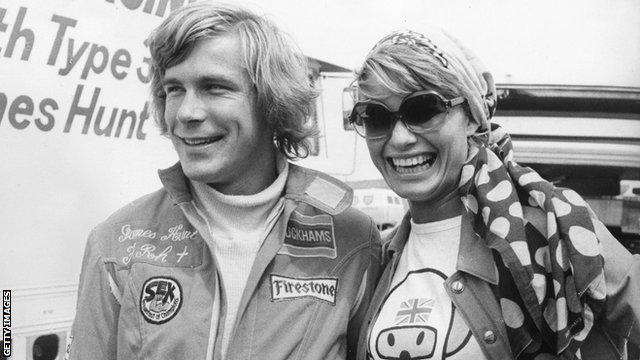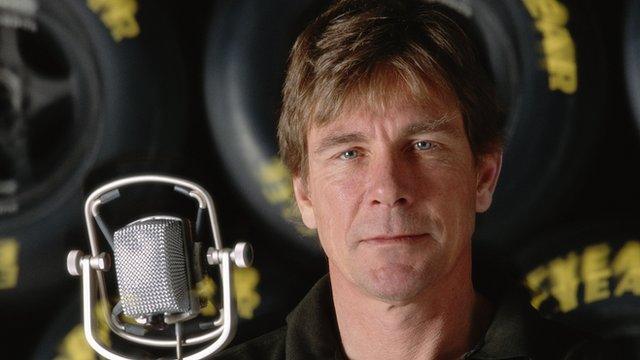James Hunt: Remembering F1's 'swashbuckling playboy'
- Published
- comments
A few years back, Niki Lauda branded Lewis Hamilton boring. As insults go, it's up there with being called ugly by Quasimodo. Because in his heyday, the cool, calculating Lauda was about as buttoned up as Formula 1 could get.
But the image of Formula 1 in the 1970s as one non-stop round of partying, with drivers making love seconds before climbing into the cockpit and guzzling magnums of champagne seconds after climbing out of it, is something of a myth.
Except, of course, for James Hunt, who died 20 years ago on Saturday, external and who was always an anachronism, even when winning the World Championship in 1976.
The golden mopped Hunt shone like a lighthouse amid the grey, wearing waves of austerity, an intoxicating throwback to apparently more care-free and less complicated times.
When Hunt burst onto the scene in the mid-1970s, he spoke of "taking up the cudgels" for Great Britain.
"We've got quite a few foreigners winning races at the moment," said Hunt. "It won't do, will it?" But Hunt wasn't only keen to emulate the feats of great British drivers past - Stirling Moss, Jim Clark, Graham Hill and Jackie Stewart - he was keen to tap into their restive spirits.
"I trained like mad," says Hunt's great rival and friend Jody Scheckter, the 1979 world champion, external. "I didn't have sex for three days before a race. I don't know how you'd be more professional than that. I had parties, just not when I was racing. Niki Lauda didn't do anything, at least that he talked about or that we saw.
"But James was outrageous. I remember racing in Japan, where they were very formal in those days. There was an event with different speeches from high-level people and he walked on stage with no shoes on, jeans with holes in and an old T-shirt. He was playing up to this English public schoolboy stereotype.
"What was it he had embroidered on his overalls? 'Sex, breakfast of champions.' Some girls like a rogue and he let it hang out in that respect. He was a boy, you know? I out-charmed him once. They must have been mad."
Formula 1 doyen Murray Walker formed an unlikely partnership with Hunt in the BBC commentary box after his retirement from driving in 1979. Hunt turned up for his first engagement in Monaco with one foot in plaster, the other minus a shoe and ploughed through two bottles of rosé during the broadcast.
"James was a product of very different times," says Walker. "He drank heavily, he smoked heavily and he was keen on women. And they were keen on him.
"But he was an extremely nice bloke underneath it all. He could be charmingly endearing at times. Although at other times he could be extremely rude and unpleasant, overbearing and arrogant.
"James had a hell of a temper, it could be absolutely terrifying. I remember being in the commentary box at the Australian Grand Prix and one of the technicians did something that annoyed James. He blew his top, ranted and raved at the chap, who hadn't done anything wrong."

James Hunt with his first wife, the model Suzy Miller. After they divorced she married actor Richard Burton
In September, Ron Howard's film based on the duel between Hunt and Lauda during the 1976 season, entitled Rush,, external is due to be released. Hunt is apparently portrayed as a swashbuckling playboy, a link to an age of certainty - real and imagined - of roistering gentlemen amateurs, living out the dreams of pie-eyed schoolboys. Lauda, meanwhile, is shown as the clean-living, scientific driver he was. "Like a computer," says Scheckter. "How I thought you should be."
Howard, as any good director must, has focused on certain truths to strengthen the narrative.
Hunt was indeed an arch roisterer, a man who claimed to have slept with 5,000 women, who caroused with the great and the good, who hoovered up cocaine in far-flung nightclubs. Who had an awful lot of fun, or at least seemed like he did.
And the 1976 Formula 1 season was indeed a transitional one, with Hunt representing the last flowering of corinthianism and the rational, ultra efficient Lauda providing a glimpse of the sport in its modern form.
But Hunt, a fine racquet sports player who was fitter than he had a right to be, possessed a ruthlessly professional streak.
He needed one to rise from the hugely competitive Formula 3 ranks, where he earned the nickname 'Hunt the Shunt', partly because of his numerous accidents but also because he once ironed out fellow driver Dave Morgan in the Crystal Palace paddock.
Having joined the big boys, Hunt put in some mightily impressive displays in a shoestring Hesketh, a car carrying no sponsors and with only one chassis and a single extra gear box in the garage. Hunt finished the 1975 season in fourth, behind champion Lauda, and landed his first victory at the Dutch Grand Prix.
When Lord Hesketh's money ran out, external - Hunt's benefactor was rich but no longer rich enough for Formula 1 - Hunt moved to McLaren, for whom he won the drivers' championship in his first season.
Ferrari driver Lauda had been romping it before a dreadful crash at the Nurburgring,, external after which he was administered the last rites. In sport's greatest comeback, he returned six weeks later only to be pipped by one point in the final race in Japan, having retired in protest at the monsoon conditions. Now that's courageous.
But a recurring character in British sport is the folk hero who burns brightly for a short time before fizzling out almost as quickly - Catherine wheels of vicarious thrills. Within three years Hunt, his heart no longer in it and, riddled with fear following the death of his close friend and Lotus driver Ronnie Peterson,, external had disappeared from the paddock.
"They called him 'Hunt the Shunt' but I never saw him as this daredevil," says Scheckter. "We went to America and on the ovals he just didn't want to do it, it scared him. He wasn't this macho, do-anything driver he was made out to be.
"People say: 'He must have been good. Look at what he did while doing all that other stuff.' Well, how good could he have been if he'd not done all that other stuff? He neglected himself, after a race he just let go.
"I picked him up after a race at Watkins Glen in New York and he hadn't bathed or slept. He got into the car and he stunk, so I hung my head out the window the whole way to the airport.
"Was he having a good time? I don't know."

Hunt commentated alongside Murray Walker for the BBC from 1979 until his death in 1993
Even after his retirement from motor racing, Hunt continued to live life fast, although he was a languid and erudite presence next to Walker in the BBC commentary box.
He also had a sensitive side, spending hours in his aviary talking to his beloved budgerigars and doting on his two boys, Tom and Freddie.
"People always go on about Dad and his playboy reputation," says Tom, Hunt's son from his second marriage to interior designer Sarah Lomax. "But those birds of a feathered variety were his true passion. I never saw anything negative. To me, he was the best daddy ever."
A string of financial calamities forced Hunt to ease off the gas as he entered middle age. When he could no longer afford his Mercedes, he swapped it for a push-bike, on which he would pootle around Wimbledon.
Having been divorced twice, Hunt found a new girlfriend who helped him quit booze and cigarettes and smoothed him out. But just when Hunt finally seemed to be having a good time, he died of a heart attack aged only 45. Some people, it seems, are not meant for a peaceful life.
It says much about the nature of Formula 1 today that Kimi Raikkonen, the mono-syllabic 2007 world champion, is often said to be Hunt's modern equivalent. Is Kimi having a good time? As with James Hunt in his hell-raising pomp, no-one really knows. But at least Hunt looked like he was.